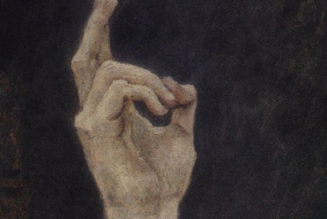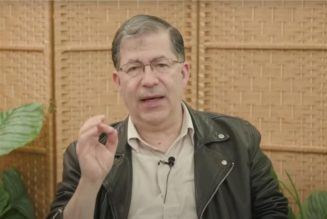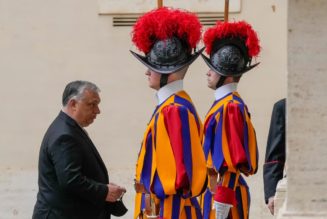
By Allison Tobola Low, MD, MA
Imagine being in a desert for forty days by yourself. There is no easy access to the comforts of life. You quickly become hungry and thirsty. With no sign of civilization, the loneliness can weigh you down. And the desert is dangerous. Life is unpredictable, and one does not have full control of every situation. Within a few days, there can be a temptation to despair. But in the desert, although the silence could be daunting, if you remind yourself that you are a creature, dependent on God and under his loving providence, you can find peace.
This imagery came to mind because, in many ways, this is what life is like during this pandemic. Each day brings new challenges. At times life is chaotic, and other times it is at a complete standstill. There are ever-increasing burdens as those in authority enact further restrictions that impact our schools, jobs, ability to socialize, and most distressingly Mass and parish life. And this has brought physical, emotional, psychological, and spiritual suffering – no one has been unscathed. This crisis has brought us all into a desert. But it is not a time to despair. It is a time to find peace amidst the chaos by putting our complete trust in God and his loving providence.
As I contemplated this analogy further, I recalled the Gospel reading for the first Sunday in Lent that we heard a few weeks ago. This account told us about the Spirit leading Jesus into the desert for forty days.
Three aspects of this event stand out as lessons to me for the trials we face in this pandemic.
The First Lesson: Facing Temptations
The first line of this Gospel reading is: “At that time Jesus was led by the Spirit into the desert to be tempted by the devil” (Matthew 4:7).
The lesson here is we must be aware that in the desert, temptations await us. We must be prepared. We must be intentional about our prayer life. If we neglect our spiritual health, we will be vulnerable because temptations are inescapable in this life and often intensify with trials and afflictions.
Of the many temptations we may face in our sufferings, we can discover one of them when we look at the word “desert.” It comes from a Latin word meaning “abandoned” or “forsaken.” In our desert experiences, the tribulations we face can lead us to doubt, to lose trust, and to think God has abandoned us. But we are being deceived – God will never forsake us! Our desert experiences can also cause us to turn inward. We can become so caught up with the struggles of life that we become selfish, and we abandon our neighbors. And worse, we can become so reliant and dependent on ourselves and so focused on our earthly life that we forsake God.
Life in the desert can be grueling. But some of the best models for surviving are the Desert Fathers and Mothers. These men and women – often religious – lived in the early centuries of the Church and freely chose to spend a portion of their lives in the desert in imitation of Christ. They did not embrace this life because it was easy – far from it. This life was extremely trying. They renounced earthly riches, honors, and the comfort of their homes to be alone with God. And they were not fleeing temptations. Instead, they chose to embrace these trials head-on, knowing that in the desert, temptations are often relentless. But they desired holiness and a perfect relationship with God, and they knew that by God’s grace, victory over temptations meant becoming more resilient, more humble, and more purified.
The Desert Fathers and Mothers teach us a desert experience should not be feared, but we must recognize the key to conquering its trials is to rely solely on God. When one of these desert fathers, a monk named Rufinus of Aquileia, was asked what a person should do in the face of temptations, he replied:
You should always weep in the presence of the goodness of God. Run to him, and he will help you. It is written, ‘The Lord is my helper; therefore, I pour contempt upon my enemies’ (Psalms 118.7).” [from De Vitis Patrum, Book III, 203]
He was then asked how he advised his brothers to pray:
You don’t need a lot of words. We should just lift up our hands to heaven and say, “Lord, as you will, and how you will, let your will be done.” And if beset by temptation or battle, just say, “Lord, help us.” He knows what is best for us. [from De Vitis Patrum, Book III, 207]
The Second Lesson: Making Demands on God
When we read about the first two temptations Jesus encountered, there is one consistent element. In both, Satan begins with, “If you are the Son of God…” Satan is saying to Jesus: “If you are who you say, then prove it.”
Throughout Jesus’ ministry, people repeatedly asked Jesus to perform miracles to prove himself. Even on the cross, the crowds cried out: “If you are the Son of God, come down from the cross” (Matthew 27:40). Pope Benedict XVI speaks about this in his book On the Way to Jesus Christ. He wrote:
This demand for proof runs through the entire story of Jesus’ life; over and over again he encounters the reproach that he has not proved himself sufficiently, that he still must perform the great miracle that will remove all ambiguity and disagreement and make it clear to everyone… (p. 87)
We, too, can be tempted to make this same demand. “God, if you exist, then show me, prove it, work a miracle.” And in times of suffering, pain, fear, and afflictions, this temptation can be amplified. Yet this attitude lacks faith because God has shown us through creation, the Scriptures, and in his Church that he exists. He has revealed he is a personal God who cares about us. And God demonstrated his unconditional love by sending his only Son Jesus to become man and to offer his life freely for us on the cross. And God wants us to abandon ourselves to his loving providence.
But we are not to make demands of God because doing so is grounded in doubt, distrust, and skepticism. We are attempting to manipulate God. This prohibition is not to suggest we should not pray for miracles or plead with God to intervene in our lives. We must! But sincere prayer is radically different from making demands. Authentic prayer is rooted in love, trust, and docility. What the Father asks is that we acknowledge our dependence on him and, then, submit our will to his and put full confidence in him.
Third Lesson: Putting Our Lord God to the Test
When Satan tempted Jesus a second time, they were standing on the parapet of the Temple. Satan told Jesus to throw himself down because if he was the Son of God, then God promised to send his angels to save him from death (quoting Psalm 91). But Jesus replied: “You shall not put the Lord, your God, to the test” (Matthew 4:6-7).
Jesus is teaching us a valuable lesson. To understand his words, we must look at the context. He is quoting Deuteronomy (6:16), where God chastised the Israelites for having rebelled against him at Massah (an event described in Exodus 17:1-7). This uprising happened early in the Israelites’ journey from Egypt to the Promised Land. The people became thirsty and complained about their life in the wilderness to the point of doubting God’s presence among them. They were ready to stone Moses and to turn away from God. But Moses pleaded with God. In response, God performed a miracle and gave them water from the rock. Yet God was not pleased that his people had put him to the test.
When Satan told Jesus to throw himself from the Temple, Jesus reminds us of this same reality: “You shall not put the Lord, your God, to the test.” If we test God, we treat God as if he is inferior to us. We act as if God must submit himself to us and our demands. We promote the illusion that God is dependent on our wants and needs. And when Jesus refuses to throw himself off the Temple, he shows us we are not to be careless and neglectful with our lives, which especially applies to our current health crisis. We cannot act unreasonably and presume God will intervene regardless of what we do because this is a form of testing God.
As the Catechism of the Catholic Church teaches:
Tempting God consists in putting his goodness and almighty power to the test by word or deed. Thus, Satan tried to induce Jesus to throw himself down from the Temple…The challenge contained in such tempting of God wounds the respect and trust we owe our Creator and Lord. It always harbors doubt about his love, his providence and his power (2119).
God loves us. He answers our prayers and intervenes in our lives – and sometimes miraculously. But this does not permit us to test him. We may not always understand why certain things happen, but we must have confidence that our heavenly Father has a loving plan for us. And he will bring good to those who love him (Romans 8:28).
These Lessons and Our Current Pandemic
This pandemic is a desert-like experience in which we will face temptations of all varieties. In particular, we need to avoid making demands of God and putting God to the test.
In this crisis, recommendations are being made that impose severe limitations on businesses, leisure activities, and our daily lives. An element of control has been taken away from us. These necessary measures have also impacted our ability as Catholics to attend Mass and receive the sacraments. As a result, many are feeling a variety of emotions, including anxiety, sadness, heartbreak, frustration, and anger.
People can debate these interventions after the fact, but the civil authorities and medical experts are trying to make the best decisions possible based on the models they have. Are the experts overreacting? Underreacting? It is too soon to know. But our bishops and priests must prudently listen to these experts and, through prayerful discernment, make difficult decisions that they believe are just, for the common good and that fulfill their duty of governing and protecting their flock.
And our shepherds must ask the same question we too must ask: how are we to best care for ourselves and each other? In her wisdom, the Church has always emphasized that we must avoid two extremes. We cannot focus solely on earthly things and excessively worry about our body because this leads to a “cult of the body” (CCC 2289). But at the same time, we are human persons – body and soul. We are not merely spirits who happen to have a body. And while our spiritual health is of the utmost importance, we must take reasonable care to preserve our life. We cannot be careless and neglectful of life as it is a gift that has been entrusted to us by God (see the CCC 2280, 2288; and Evangelium Vitae, no 2).
There are many opinions as to how this is best lived out, especially in our current crisis. And it is especially challenging since the situation is unpredictable and changing daily. Our situation calls for prudence and not carelessness, patience and not discouragement, courage and not rashness, trust and not doubt. And now is a time when we need unity and not division, solidarity and not selfishness, hope and not excessive worry. Together, let us pray for leaders and decision-makers (bishops, priests, civil leaders, etc.), healthcare workers and researches, the sick and suffering, the people of the world, and for an end to this crisis.
And above all, let us put our trust and hope in God’s loving providence.
And as Pope Benedict XVI explains in his book, the devil misinterprets Psalm 91. God here is not asking us to test him but is teaching us an important truth:
Someone who obeys God’s will knows that in all the horrors he may experience, he does not lose a final refuge. He knows that the foundation of the world is love and that, therefore, even in a situation where no man is able or willing to help him, he can still continue walking in confidence toward the One who loves him. Such confidence, which Scripture encourages us to have and to which the risen Lord invites us, is something quite different, however, from the reckless defiance of God that would make God into our servant (p.94-95).









